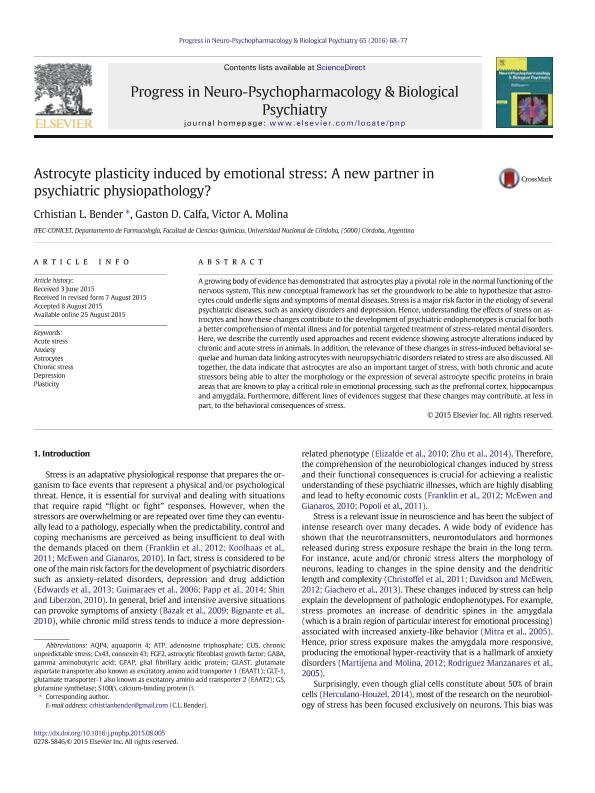Mostrar el registro sencillo del ítem
dc.contributor.author
Bender, Crhistian Luis

dc.contributor.author
Calfa, Gaston Diego

dc.contributor.author
Molina, Víctor Alejandro

dc.date.available
2018-06-26T17:42:20Z
dc.date.issued
2016-02
dc.identifier.citation
Bender, Crhistian Luis; Calfa, Gaston Diego; Molina, Víctor Alejandro; Astrocyte plasticity induced by emotional stress: A new partner in psychiatric physiopathology?; Pergamon-Elsevier Science Ltd; Progress of Neuro-psychopharmacology and Biological Psychiatry; 65; 2-2016; 68-77
dc.identifier.issn
0278-5846
dc.identifier.uri
http://hdl.handle.net/11336/50107
dc.description.abstract
A growing body of evidence has demonstrated that astrocytes play a pivotal role in the normal functioning of the nervous system. This new conceptual framework has set the groundwork to be able to hypothesize that astrocytes could underlie signs and symptoms of mental diseases. Stress is a major risk factor in the etiology of several psychiatric diseases, such as anxiety disorders and depression. Hence, understanding the effects of stress on astrocytes and how these changes contribute to the development of psychiatric endophenotypes is crucial for both a better comprehension of mental illness and for potential targeted treatment of stress-related mental disorders. Here, we describe the currently used approaches and recent evidence showing astrocyte alterations induced by chronic and acute stress in animals. In addition, the relevance of these changes in stress-induced behavioral sequelae and human data linking astrocytes with neuropsychiatric disorders related to stress are also discussed. All together, the data indicate that astrocytes are also an important target of stress, with both chronic and acute stressors being able to alter the morphology or the expression of several astrocyte specific proteins in brain areas that are known to play a critical role in emotional processing, such as the prefrontal cortex, hippocampus and amygdala. Furthermore, different lines of evidences suggest that these changes may contribute, at less in part, to the behavioral consequences of stress.
dc.format
application/pdf
dc.language.iso
eng
dc.publisher
Pergamon-Elsevier Science Ltd

dc.rights
info:eu-repo/semantics/openAccess
dc.rights.uri
https://creativecommons.org/licenses/by-nc-nd/2.5/ar/
dc.subject
Acute Stress
dc.subject
Anxiety
dc.subject
Astrocytes
dc.subject
Chronic Stress
dc.subject
Depression
dc.subject
Plasticity
dc.subject.classification
Neurociencias

dc.subject.classification
Medicina Básica

dc.subject.classification
CIENCIAS MÉDICAS Y DE LA SALUD

dc.title
Astrocyte plasticity induced by emotional stress: A new partner in psychiatric physiopathology?
dc.type
info:eu-repo/semantics/article
dc.type
info:ar-repo/semantics/artículo
dc.type
info:eu-repo/semantics/publishedVersion
dc.date.updated
2018-06-26T13:38:35Z
dc.journal.volume
65
dc.journal.pagination
68-77
dc.journal.pais
Estados Unidos

dc.description.fil
Fil: Bender, Crhistian Luis. Consejo Nacional de Investigaciones Científicas y Técnicas. Centro Científico Tecnológico Conicet - Córdoba. Instituto de Farmacología Experimental de Córdoba. Universidad Nacional de Córdoba. Facultad de Ciencias Químicas. Instituto de Farmacología Experimental de Córdoba; Argentina
dc.description.fil
Fil: Calfa, Gaston Diego. Consejo Nacional de Investigaciones Científicas y Técnicas. Centro Científico Tecnológico Conicet - Córdoba. Instituto de Farmacología Experimental de Córdoba. Universidad Nacional de Córdoba. Facultad de Ciencias Químicas. Instituto de Farmacología Experimental de Córdoba; Argentina
dc.description.fil
Fil: Molina, Víctor Alejandro. Consejo Nacional de Investigaciones Científicas y Técnicas. Centro Científico Tecnológico Conicet - Córdoba. Instituto de Farmacología Experimental de Córdoba. Universidad Nacional de Córdoba. Facultad de Ciencias Químicas. Instituto de Farmacología Experimental de Córdoba; Argentina
dc.journal.title
Progress of Neuro-psychopharmacology and Biological Psychiatry

dc.relation.alternativeid
info:eu-repo/semantics/altIdentifier/doi/http://dx.doi.org/10.1016/j.pnpbp.2015.08.005
dc.relation.alternativeid
info:eu-repo/semantics/altIdentifier/url/https://www.sciencedirect.com/science/article/pii/S0278584615300257
Archivos asociados
